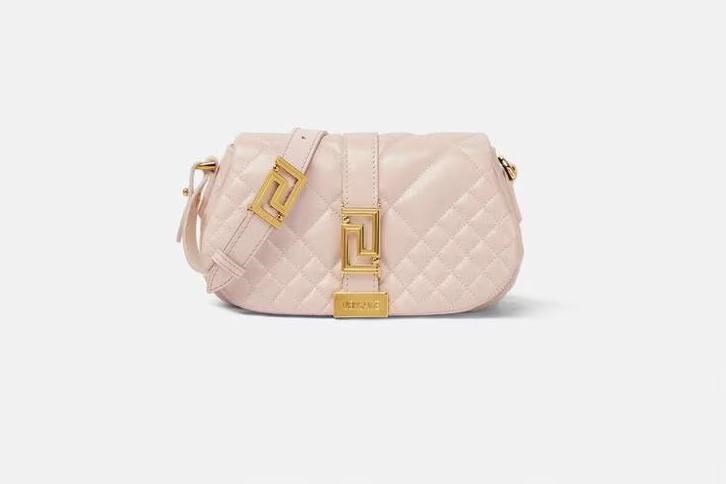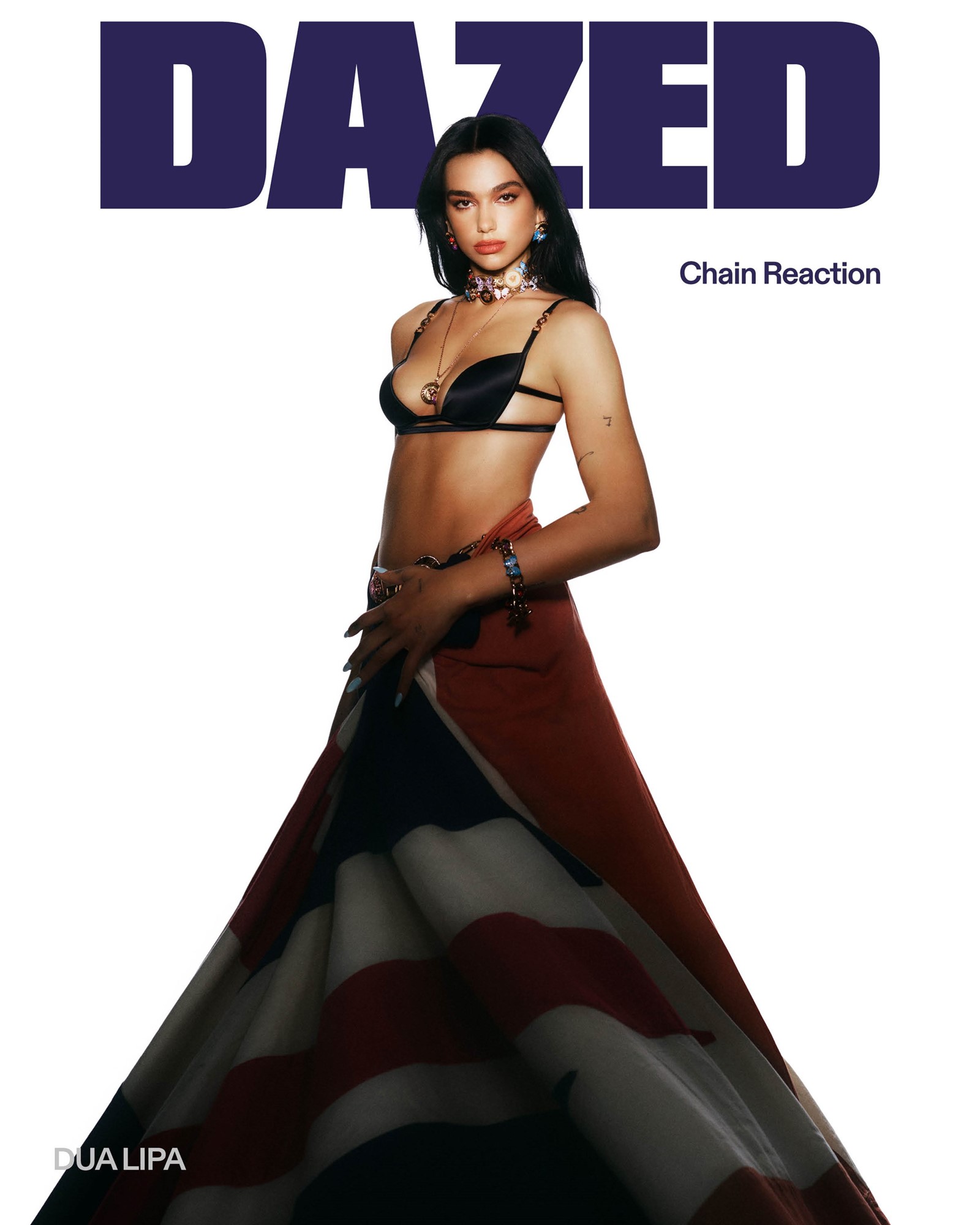Dua Lipa’s brow is furrowed, as if she is trying to crack a particularly knotty trigonometry problem. On a cloudy May afternoon, she stands behind a stately vintage mixing desk in Manhattan’s exclusive Jungle City Studios with folded arms and a wide stance as $40,000 speakers blast out her effervescent, currently unfinished, theme song for Barbie, Greta Gerwig’s DayGlo study of life in plastic. “I can take the heat / baby best believe, that’s the moment I shine,” she sings, her words punctuated by handclaps. With ribbony strings and bass that sizzles, it brilliantly deploys every rule in the disco-funk playbook to hit your hedonic hotspots with a sledgehammer. As the song unfurls, I follow her gaze through a window to the studio’s spacious live room – less of a recording booth than a studio apartment – which offers panoramic views of the Manhattan skyline and houses a pillar box-red Steinway piano, lacquered like a manicure.
Jungle City was founded by Ann Mincieli, a longtime engineer for Alicia Keys, who aimed to create a recording experience that, as she put it to The New York Times, felt like a “seven-star hotel”. Since opening in 2011, it has been a recording mecca for pop’s elite and an incubator for their best work; the albums worked on here include Rihanna’s ANTI, Taylor Swift’s 1989, Ariana Grande’s Thank U, Next, and Beyoncé’s epoch-defining trio 4, BEYONCÉ and Lemonade. Dua is in the studio for a few hours this afternoon and, while I wouldn’t presume to think that a pop superstar’s schedule has been shuffled around for my benefit, our scheduled meeting here sends a message: this is the kind of artist she is now.
“SOPHIE said that [pop] is the loudest, brightest thing in the room. But that can come in so many shapes and forms. It can be anything” - Dua Lipa
After the song ends, Dua grabs her phone from the aux cord. “Greta said that the whole film was inspired by disco,” she says. “There’s a lot of very glittery and pop moments in it.” Barbie marks Dua’s debut film role; she plays a blue-haired mermaid who, appropriately, is named Mermaid Barbie. She teamed with Versace on a womenswear collection premiered at Cannes in May, and will launch a book club this summer while continuing work on her third album. Two days before we meet, she was a co-host at the Met Gala, a cast-iron stamp of approval from fashion’s elite. Dua wore a 1992 Chanel bridal look made famous by Claudia Schiffer and, after things wound down at the Costume Institute, changed into bike shorts and hosted an afterparty at Virgo, a club on the Lower East Side. “I felt like a princess, and then went raving in the evening,” she says, beaming while seated on the penthouse’s artfully cracked leather sofa, one leg tucked. “So it was perfect.” The sole, inevitable downside was that she felt “dead” the following day. Her tried and tested hangover cure? “A cold shower. A Diet Coke really does just bring me back to life. And some good, delicious food.”
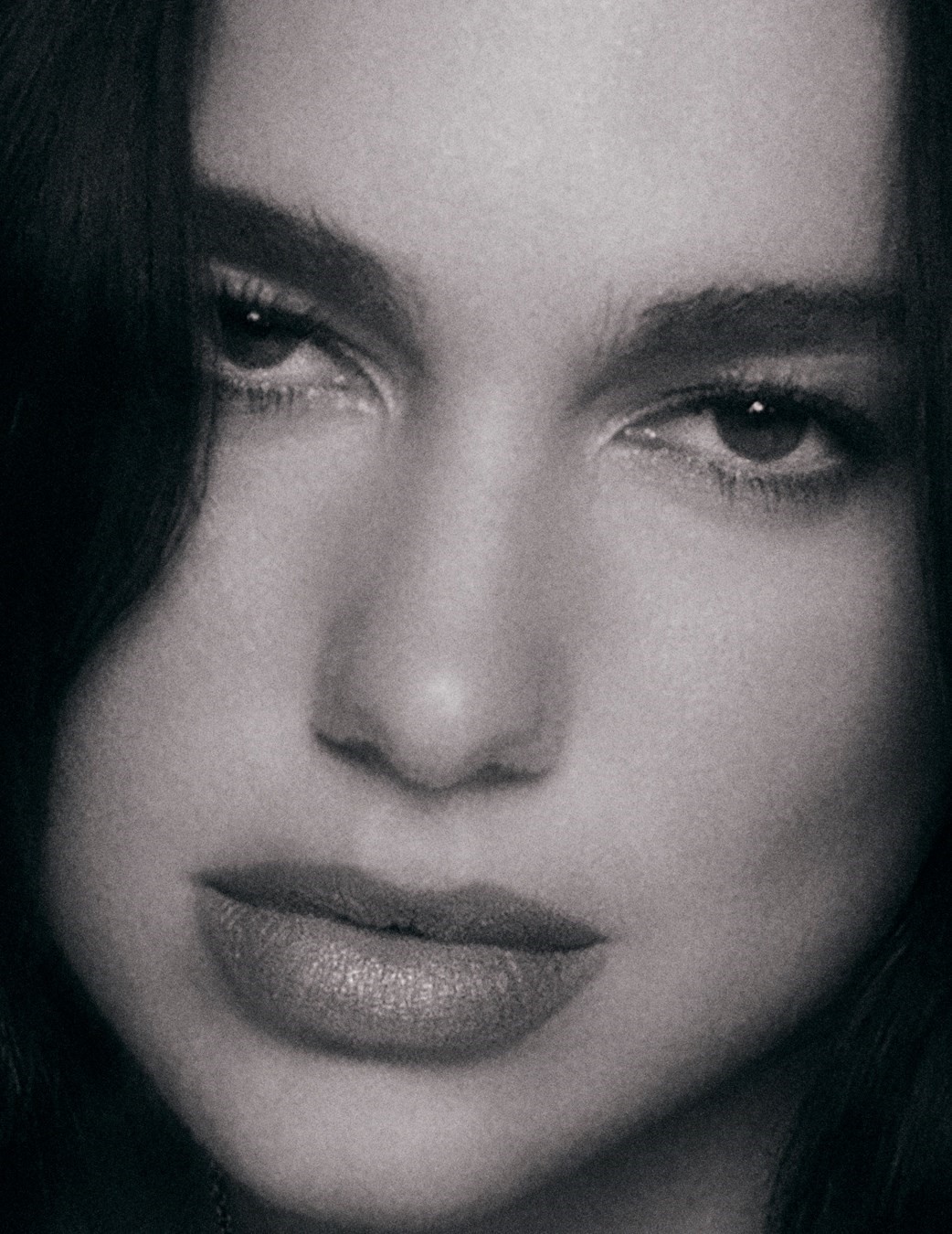
Dua is serious about her music and the commitments that come with it. But she is determined to enjoy herself, too. “I think it’s really nice to have that juxtaposition and get down and dirty once in a while,” she says of her “post-Met mashup”. Pop is a science and Dua Lipa, as the only female artist to have multiple albums exceed 10bn Spotify streams, has the stats to prove she has mastered it. After a couple of false starts, she entered music’s major league in 2017 with the trop-pop instructional “New Rules” and, the following year, “One Kiss”, a Calvin Harris collaboration-turned-Liverpool FC terrace anthem that spent eight weeks at number one on the UK charts. Her 2020 album Future Nostalgia, fuelled by a heady merging of disco-funk, hip hop and spiky new wave, cemented her as a pop trailblazer, predicting the wave of disco-inspired pop hits and indie releases that followed. Future Nostalgia felt like the rare record that wasn’t rubbernecking at other trending sounds, and her exhortations to “fly away with me tonight”, delivered with her lightly husking mezzo-soprano, felt like irresistible invitations. Pop had been in search of its new It girl and, in Dua Lipa, found a young savant that made playing its game look like the most fun in the world.
She capped the Future Nostalgia era with a 2022 global tour comprising 82 shows. “It changed my life,” Dua says, speaking by phone a week before the Met event. “Looking back, I’m like – I did that.” It felt to her like things “could only get better from there”. Part of Dua’s canniness in navigating pop life is reliably staying one step ahead of her critics. If her choreo was spotty, she would rehearse harder, and then take time in her show to recreate, and wink at, her much-memed “pencil sharpener” dance. If, per an early Guardian review, her performances could leave some audiences feeling she had “nothing to say”, she would lean into what one critic called her “hard, plastic pop” and engineer it to expensive, military-grade precision. More literally she would become a doll, the ur-doll, Barbie. Part of the appeal, she says, is that Gerwig’s “films never really feel like the male gaze. They have very interesting female protagonists.” Mermaids, such as her character, famously dwell in the ocean. Did she have to film underwater? “Not necessarily,” Dua says.
“The tabloids are always trying to catch you out, because it’s what sells. Social media has its downfalls, but it’s a really good way for people to take their own rhetoric into their own hands” - Dua Lipa
The 11.5-inch, double-jointed frame of Barbie has weathered the slings and arrows of critical discourse since her creation in 1959. Second-wavers like Gloria Steinem have said that Barbie represents “everything the feminist movement was trying to escape”. But she has also represented self-creation for women. In The Motherlode, her authoritative book on women in hip hop, Clover Hope notes that Lil’ Kim’s style “said it was OK for women to want to dress like a doll”. When asked about Barbie’s baggage by The Gentlewoman, Gerwig replied: “I think it’s Walter Benjamin who said that there’s no tool without blood on it.”
Dua says that the film will challenge the audience’s idea of what Barbie represents. “Barbie, the doll, has this idea of what perfection should be,” says Dua evenly. “The film – and there’s a lot of diversity in the cast – is touching exactly on the buttons that maybe it presses, and shows a different story.” Growing up in north London, Dua had Barbies herself, but says she was “much more the kind of girl that would go to the playground, make up dance routines and sing”. Did her dolls receive home haircuts? “Yes, actually, that was more what my Barbie was used for.” Did you ever cut all their hair off? “Not all of it. Just in bits. It depended on the styling.”
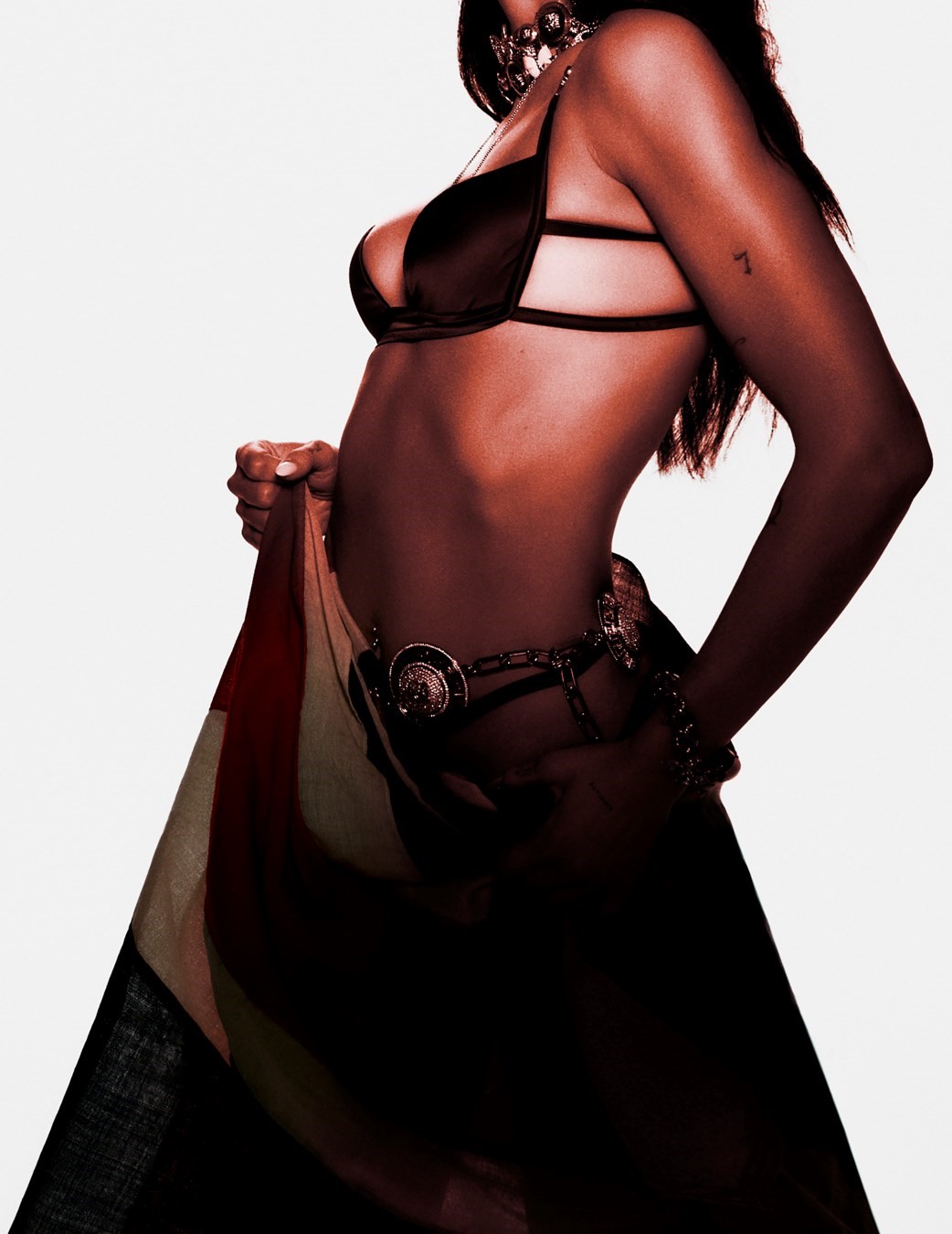
This season, Dua is the guest designer for La Vacanza, Versace’s luxury beachwear line. “I can show you some of my drawings if you wanna see?” she says, fishing her phone from somewhere within the penthouse’s couch and tapping away with her French tips. “I’m really shit at drawing,” she says merrily, swiping between images of pen-on-paper sketches that would become a capsule collection of bright prints, logo-printed tailoring, backless dresses with peekaboo thongs and pink bikinis held together with gleaming metal chains. “She has a great eye,” says Donatella herself over email. “I have worked with some amazing musicians over the years – Prince, Madonna, Elton John, Whitney Houston – and they all bring a different perspective to the table and a real understanding of their audience and how to connect with them. Dua is the same.”
“It’s one of the very rare occasions where I work with someone and it really is exactly how you envision it,” says Dua of Donatella, who has become a firm friend. “We text a lot, and she had such incredible input. On some of the dresses I would put a metal buckle and she was like, ‘Maybe we should make that buckle pink to modernise it in a different way.’ She wants you to feel amazing – and she wants you to be heard.” As part of the design process, Dua was given access to the Versace vault. “They gave me the opportunity to go into the archive and pull out Gianni’s early prints. We were able to bring [those] back a bit, modernise [them] and create a fun summer collection I feel very proud of.”
She credits her work ethic to her parents. “I saw them manage so many different things,” says Dua. “There was no shying away from hard work.” Her parents moved from Kosovo to the UK in 1992, three years before she was born, and to make ends meet they worked in hospitality, while her dad took night classes in marketing. At nine, Dua began going to Saturday classes at Sylvia Young Theatre School and, on account of her deeper, mature voice, was promptly moved into a more advanced class where she sang alongside students five years her senior.
Dua continued to perform after the family moved to Kosovo when she was 11 – there’s an incredible video of her singing to Alicia Keys’ “No One” at school. A few years later, she began posting YouTube covers of her own, with renditions of belters like Christina Aguilera’s “Ain’t No Other Man” and Jessie J’s “Price Tag”, and, when she was 15, persuaded her parents to let her return to London to take her GCSEs and re-enrol at Sylvia Young. At 17, after appearing in a TV spot promoting The X Factor, Dua’s lawyers linked her with Ben Mawson and Ed Millett, who signed her to their Tap manage - ment company; she signed with Warner Brothers in 2014.
Dua was always drawn to the (relatively) edgy end of the millennium-era Top 40; the first album she owned was Nelly Furtado’s trip-hop inspired debut Whoa, Nelly!, and, later, Pink’s Missundaztood. “I love my pop girls,” she says today, adding that Britney Spears, Gwen Stefani and Jennifer Lopez were among her early favourites. Dua’s music, with its irony-free embrace of major-label maximalism, hits similar pleasure centres to early 00s chart mainstays. But she always manages to retain a blithe sense of cool, edging her spiritually closer to the raw-feeling realness that is contemporary pop’s coin of the realm.
On her 2022 album Crash, Charli XCX embraced the idea of pop archetypes with a “sellout era” built on slick choreography and shameless samples. “We live in this world where there is desperation and fear for authenticity,” said Charli on Dua’s At Your Service podcast. “Sometimes I’m like, ‘Sell me the dream.’ I want my pop stars to sell me the fucking dream.” I ask Dua what she thinks. “I love the main pop-girl energy,” she says. “It’s so fun for the fans and the character. I can be that girl; I can do that for the videos, for the red carpet, for the performances. For me there’s a time and a place to do that. There are so many sides to me that I also love to embody.”
This is where 2023 main pop girls differ from 2003 main pop girls, Dua recognises. In TRL’s imperial era, big budget videos and glamorous perfor - mances often veiled poor conditions and a lack of care for the welfare of young stars, particularly women. Does she think it’s a better time to be a pop star now? The tabloid chatter is still “pretty relentless”, she says. “It’s always trying to catch you out in a bad way, because it’s what sells. Social media has its downfalls, but it’s a really good way for people to take their own rhetoric into their own hands.” Musicians are increasingly wary of bad deals, and more women are in positions of power behind the scenes, she says. “But it’s not perfect. I don’t know when we’ll get to a perfect place, but I think it’s definitely better than it was before.”
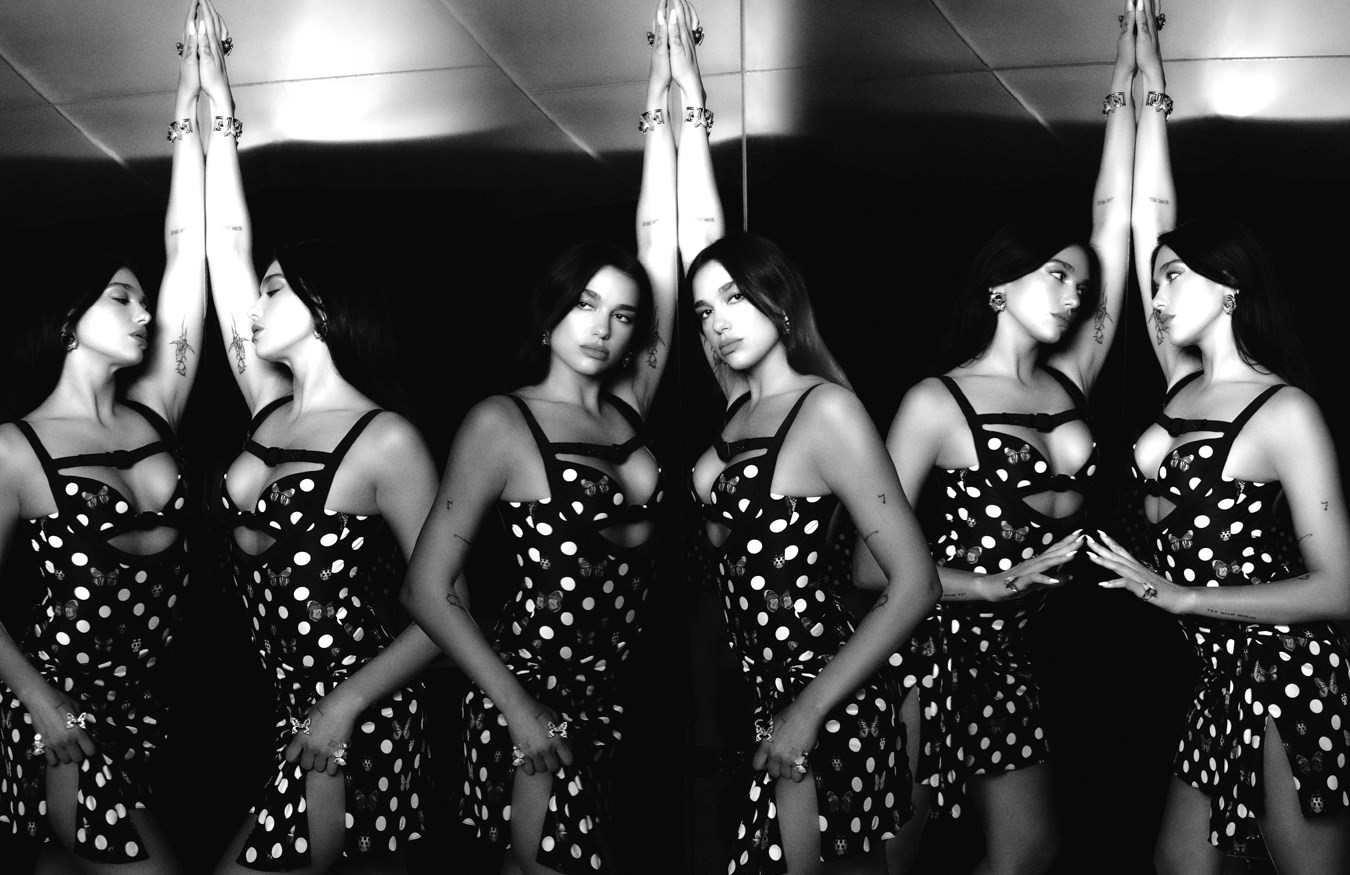
Much of what Dua wants to say has little to do with gossip at all. She runs a weekly newsletter, Service95, which is billed as “the ultimate cultural concierge” and also offers a buffet of features on topics from the Russian kleptocracy to independent bookstores in Malaysia. And, as her star has risen globally, she has never forgotten her ancestral home of Kosovo. In 2018, Dua and her father started Sunny Hill Festival, an event in Pristina and Tirana which has brought international artists like Miley Cyrus, J Balvin and Skepta to perform. In November 2022, Dua was granted honorary Albanian citizenship, which she described at the time as an “indescribable great joy”. But the country’s immigrants in the UK face unfair stigmatisation. Home Secretary Suella Braverman, who has handled Britain’s immigration debate with the empathy of a baby-eating dingo, made inflammatory comments about “Albanian criminals” in the House of Commons in March. “The UK wouldn’t be what it was if it wasn’t for immigrants,” says Dua. “It feels so short-sighted to not appreciate and see the beauty in that. For me, it’s very difficult to understand where a lot of governments are coming from in blaming crime on people coming in from different countries. I don’t think that is the cause. There’s a lot more work that needs to be done to fix those issues, but [blaming these people] is not leading to anything good, it’s actually just separating people entirely and it’s very polarising.”
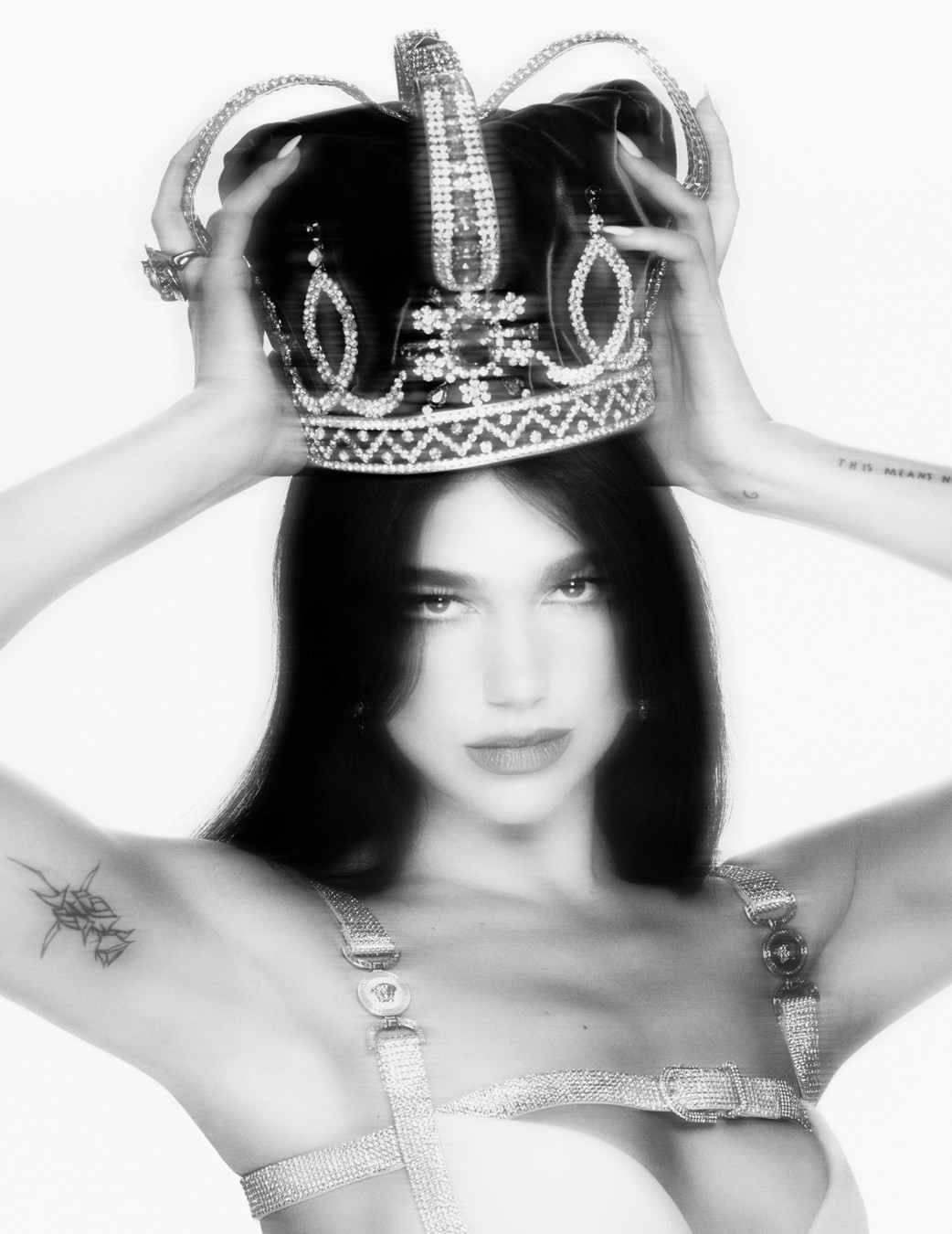
Ultimately, though, Dua just wants to show up and shine. As her highgloss music finds a home in Hollywood, the singer is choosing projects that bake in self-awareness with their sparkle. That knowing ethos seemingly underlines both Barbie and Dua’s forthcoming role in Argylle, a spy thriller from Kingsman director Matthew Vaughn. But there will always be time for dancing and wearing too much jewellery and staying up until sunrise. If this is life in plastic, then it sounds like one hell of a time.
Even on a studio day Dua is gleaming; she wears chunky necklaces, a leather handbag with fetishy buckles and statement earrings that catch the afternoon light as she talks. I think about a quote from the iconoclastic British producer SOPHIE, who was unabashedly serious about things that can be dismissed as superficial. She said, “I think all pop music should be about who can make the loudest, brightest thing.”
“Lots of artists [are] finding out their own way of how to do pop, whichever way it’s embodied,” says Dua, nodding to the likes of PC Music and their hyperpop offspring. “I think we now live in a world where there are no genres per se. We say it’s pop because it’s what SOPHIE said – it’s the loudest, brightest thing in the room. But that can come in so many different shapes and forms. And it can be anything.”
Hair BRYCE SCARLETT for DYSON at THE WALL GROUP, make-up SAMANTHA LAU at THE WALL GROUP, nails KIM TRUONG at STAR TOUCH AGENCY, set design PATIENCE HARDING at NEW SCHOOL, photographic assistants PIERRE NOWAK, DAVID KATZINGER, MCKINSEY JORDAN, tailor SUSIE KOURINIAN, styling assistants MICHAEL VASQUEZ, HUNTER CLEM, hair assistant JET PRESLEY, digital operator BENOIST LECHEVALIER, production CONNECT THE DOTS, DIVISION, production assistants KELSEY ROMERO, NICO ROBLEDO, post-production INK
